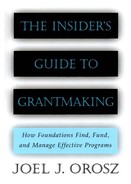Sentry or Steward?
The character of the program officer is perhaps the most underrated attribute of good grantmaking. The quality of that character does much to determine which of the grantmaker's dual roles will predominate, that of the sentry or the steward. When you find and decline a bad idea–good proposal, you are quite appropriately guarding the foundation's resources: being a sentry. When finding and funding a good idea–bad proposal, you are wisely spending the foundation's resources: being a steward. Although these are two very different roles, the conundrum is that you must play both, and often must switch back and forth between the two many times in a single day.
The sentry mentality, when taken to extremes, creates what Spiro Agnew once described as a “nattering nabob of negativity.” The overzealous sentry lives to seek, expose, and capitalize on flaws in proposals. To the sentry, grantseekers are all more or less unworthy and doing their best to separate the foundation from its money. The essence of doing a good job is to discover reasons why a proposal—or even an applicant—is undeserving of the foundation's support. If the proposal is well written, the smooth narrative only masks nefarious intent; poor writing is in itself grounds for rejection. Good ideas that require development are not good ideas at all. Sentries borrow the approach of retail liquidators: everything must go!
Stewards, by contrast, live to seek, expose, and capitalize on the potential of the ideas contained in a proposal. To be sure, they must turn down proposals, even many that have good ideas embedded in them, for there are always more worthwhile ideas than there are funds to support them. Stewards, however, see the possibilities inherent in the best of the ideas, even if those ideas come wrapped in poorly written proposals and even if the ideas themselves lack polish. Stewards see it as their job to help add value to both the proposal and the idea so that the project can be funded.
Your task as a program officer is to jump back and forth between the negative and positive poles of your job. On first contact with an applicant, you must be a sentry, for it would irresponsible to be encouraging about the prospects for funding before learning about the idea. For the majority of proposals received, you must remain a sentry, for you will have to turn them down. For those proposals that have potential, however, you must become, at some point in the process, a champion of the applicant. At that point, you make the transition to being a steward. When program officers lack character, they experience difficulty in making this transition and become perpetually stuck in the sentry mode. It takes no character to do so, for any idea, no matter how good, can be judged and found wanting if the judge is so inclined. It does require character to add value and to take risks when making grants. Besides, can there be anything more useless than a onedimensional sentry in an organization that must, in order to comply with the law, spend 5 percent of its net asset value every year?
